 |
Looking
back on the ultimate '70s road trip
|
|
By
MIRIAM KING, BRADFORD WEST GWILLIMBURY TIMES
|
Eric
Whitehead and Murray Jupe are the co-authors of
"Then There Was One: The Ultimate '70s Road
Trip" - a book that not only chronicles a
personal journey in 1971, but also provides a
snapshot of an era.
"Basically,
in 1971 my friend and I graduated high school,
and we decided to delay going to university -
and go somewhere," says Whitehead.
They
bought a $500 car in Toronto, and on January 2,
1971, left on a round trip to Acapulco, Mexico
- with an old Kodak "Pony" camera, an
instamatic, an endless supply of optimism and
whatever money they could save up in six months.
It
was a time when many young people took time off
to backpack through Europe, but Whitehead and
Jupe were concerned about the weather, language
and "bottom line. It boiled down to dollars
and cents... we knew if we were driving, it would
be less expensive than flying somewhere and staying
in hotels."
It
turned out to be as much an exploration of North
American culture, as a vacation. They were in
Florida when Apollo 14 was ready to launch and
were invited into the press room in Houston to
see the lift off.
They
were "appalled" and shocked by the blatant
racism they found in a newly-desegregated U.S.
South, and by the attitude of "Anglos"
in Acapulco toward the native Mexicans.
Even
so, Whitehead calls the time spent in Mexico the
"highlight of the trip. We had never been
somewhere like that before." Despite warnings
to watch out for bandits in those pre-cartel days,
despite being unable to speak the language, the
young Canadians found the people friendly, helpful
and fascinating.
"We
were determined we were going to do something,"
Whitehead says. "We learned a lot about ourselves.
We learned a lot about life."
It
couldn't last, of course. Nothing puts stress
on a friendship like travelling together, in close
quarters - and in Las Vegas at the end of March,
on their way home, they went their separate ways.
"Arguments, endless discussions... it was
worse than being married," says Whitehead.
Jupe
travelled to Vancouver. Whitehead spent another
six weeks on the road, heading back to Toronto.
And, he says, "It took until 1977 until we
spoke to each other again."
That's
when they met again by chance - and "we've
been best friends ever since."
All
during the trip, Whitehead kept a journal. Those
journal entries, combined with the colour photos
restored from 35 mm slides, make up "Then
There Was One."
"The
text is basically what's in the journal,"
Whitehead says. "There's a real pop culture
feel to it."
It
was when he retired from the electrical distribution
industry that he began transcribing everything
to computer and began working on the slides.
Self-published,
"Then There Was One: The Ultimate '70s Road
Trip" sells for $22 and is available from
the author, at ewhitehead@rogers.com.
Whitehead admits that the price doesn't cover
publishing costs - the first printing is in full
color, on glossy paper - but then, he says, "It
was a labour of love."
And
now, on the 40th anniversary of the trip, he says,
"I can't believe we made it from point A
to point B, and made it alive." It's a trip
that couldn't be done today. Great swaths of the
US and Mexico were sparsely settled, there wasn't
the same level of tension or fear of terrorism.
Even Disney World didn't exist at the time they
drove through Florida; it opened at the end of
'71.
Whitehead
lives in Gilford, Ont. is an instructor at Delfs'
Tae-kwon do and has 2 kids of his own. And yes,
he has taken them on road trips.
|
|
|
Road
Trip!
|
|
By
Miriam King, QMI Agency Thursday,
August 7, 2014
|
Summer
is associated with road trips - throwing the bags
in the car, and heading off on the open road.
But
if you really want to see the countryside, while
avoiding the crowds and peak prices, try travelling
at off-peak times.
That’s
the advice of Eric Whitehead, and it’s based
on experience. For 20 years, from 1984 to 2004,
he took his family - wife Karen and sons Gavin
and Adam - on an annual road trip, usually in
October, to destinations across the US
The
boys were ages 6 and 3 when the adventures began.
“At the time of their graduation from high
school, they had been to all 48 States,”
Whitehead says, travelling by van for 2 to 3 weeks
at a time.
At
every location and along the way, they took photos
and videos of their travels - material that Whitehead
has now transformed into a new book, The Holiday
Road. Each chapter is a different year, each year
a different road trip.
Whitehead
says that only once did they change their travel
plans at the last minute, and make a spur-of-the-moment
decision. It was a year that the family had planned
to head down to Florida - but on the way down
from their Gilford home, they learned that a Hurricane
watch had been issued. After checking the weather
maps, they decided to head for the only sunny
area: Colorado.
It
turned out to be a great decision, travelling
across (to them) new territory. “It was great
because we had never been to any of the States
in between,” Whitehead said. The only problem?
They had packed for Florida. “It was a little
cool at times.”
Asked
about the best road trip, he says, “Probably
the year we went to the Southwest.” Once
through the flatlands of Kansas, it was a series
of positive experiences, including horseback riding
in the desert just after dawn, a trip to the Grand
Canyon, visiting an Arizona movie studio where
even First Aid providers were in costume, and
coming back through Utah where “the canyons
were spectacular. Not to belittle the Grand Canyon,
but these were more spectacular.”
It
also helped that both boys were baseball fans;
working in a baseball game or two “was always
a common denominator for every trip.”
There
were no disasters - although, frequently after
arriving at their reserved hotel, they would switch
rooms or even hotels. “Usually when we did
that, we ended up in a really great place!”
The
experience has had an impact on his boys. Gavin,
now 34, works for a company that provides travel
packages for teens. “He’s been to Australia,
he’s been to Europe several times. He’s
now in Costa Rica... He’s officially in the
travel industry.”
The
younger son, Adam, who suffered from car sickness
on the road trips, is now married with children
and also takes his family travelling - but by
air.
The
Holiday Road is Whitehead’s 4th book, available
on his website, www.thatroadtripbook.com for $25
plus shipping. He will also have a booth at Carrotfest,
August 16, where he’ll be selling and autographing
copies - and chatting about hitting the open road.
“One
thing is for certain, travelling gives children
an education that cannot be equalled in any book,
movie or classroom,” he says.
|
|
|

|
 |
|
Author
Eric Whitehead with his latest book - chronicling
20 years of road trips with his wife and two sons,
across the US
Whitehead is a resident of Gilford, Innisfil.
MIRIAM KING/BRADFORD TIMES/SUNMEDIA
|
|
Travels
to Vietnam, and The Rock
|
|
By
Miriam King, Bradford Times Thursday,
August 13, 2015
|
Eric
Whitehead started his travels in 1971, when he
and friend Murray Jupe took a road trip across
the US, at a time of cultural change and turmoil.
Nixon was president; America was shaken by race
divisions, and by demonstrations against the war
in Vietnam.
It
may not have been the most relaxing “vacation”,
but it left Whitehead with a life-long passion
for travel. Each year, from 1984 to 2003, he and
wife Karen took their sons Gavin and Adam on a
road trip to a different destination in North
America. Since the boys have grown up, Eric and
Karen have travelled the world on their own -
and Whitehead, taking photographs and keeping
journals of each trip, has transformed the personal
journeys into a series of travel books.
The
couple's 2013 trip to Vietnam and Cambodia, and
2014 travels in Newfoundland, are the basis of
his latest books.
“Emerging
from the Shadows: Exploring Vietnam and Cambodia”
chronicles their first time in Asia. They chose
Vietnam and Cambodia primarily because the cost
was one-third that of a visit to China.
Whitehead
admits he expected to see more signs of the impact
of the Vietnam War. “I went thinking that
there was going to be a real attitude about Americans...
There wasn't that at all. They have no animosity
at all about the Americans – they have more
animosity to the French,” who started the
conflict in 1955.
Working
with a US Tour company, the Whiteheads customized
their 3 week adventure, adding the Mekong Delta
to the proposed trip, as well as a side journey
into Cambodia. There were moments when thoughts
of the Vietnam War intruded: travelling on an
open sampan, through tunnels of vegetation in
the Delta, the boat motor sounded eerily like
a helicopter – bringing to mind the images
in every movie on the war. It was “unnerving,”
Whitehead says.
And
during a hike in the Sapa Valley, in northern
Vietnam, their guide led them to a guest house
for lunch, where they sat down with the family.
“They didn't speak a word of English, we
didn't speak Vietnamese,” and Whitehead couldn't
help but wonder if the family had been Viet Cong
during the war.
There
were moments of culture shock. Hanoi is a city
of 6 and a half million people, “and there
are that many motorcycles. It was just something
I wasn't used to,” he says. And then there
was the heat – 38C in Vietnam, 42C in Cambodia.
They
visited in March, during the off-season –
which meant they weren't jostling other tourists,
even on visits to some of Cambodia's 450 temples,
dating back 1000 years or more. “The people
were fantastic, and we felt very safe everywhere
we went... I would go back to Vietnam again, in
an instant.”
The
following year, the Whiteheads travelled to Newfoundland.
“We
needed something that would be a little more cost-effective
for us,” Whitehead says. “That was the
only province we've never been to” - and
the first time the couple were able to use their
air mile points.
The
Whiteheads spent a month on the Island, again
travelling off-peak in May and June, and renting
a car to make their way from outport to outport,
starting in Gros Morne National Park wilderness
area.
They
did a lot of hiking, and logged about 6,000 km
on the rental vehicle. Even so, Whitehead says,
“A month is not enough. We saw only half
of Newfoundland.” The result is his book,
“Exploring the Rock.”
Among
the stops: L'Anse aux Meadows world heritage site,
a settlement established by the Vikings; and the
capitol city of St. John's – but they didn't
make it to Labrador. Due to thick ice and icebergs,
calving from the melting Greenland ice sheet,
the ferry wasn't running.
“We
wanted to see icebergs,” Whitehead says,
and they did – including a huge berg in the
harbour at St. John's, a sight that impressed
even the Newfoundlanders. “They had never
seen so many icebergs.”
The
Whiteheads stayed mostly in housekeeping cottages,
scattered around the coast. “Beautiful, incredibly
well-kept – it was just like you were at
home,” he says, but found the outports “a
little depressing... You could tell there was
nothing in the town. Although the town was dying,
people were still taking care of their property.
“There
were no 'dumpy' areas; that's kind of what strikes
me more than anything.”
Most
memorable, though, were the friendly people –
and the moose.
Newfoundland
has thousands of moose, who pose a hazard for
motorists, especially at night. Infrared detectors
have been installed around the major cities and
towns that flash a warning light when moose are
detected, and there are cautionary signs everywhere.
The
first time the Whiteheads spotted a moose, standing
beside the road, they were surprised by its size,
and fearlessness. The animal stood for a moment,
and then ambled across the road. “It's no
wonder they get hit!”
“Emerging
from the Shadows” and “Exploring the
Rock” are $25 each, available online at www.
thatroadtripbook.com Whitehead will also be selling
copies of his books at Bradford's CarrotFest street
festival, August 15.
The
Gilford resident is retired, and plans to continue
travelling, and writing. He has stepped foot on
5 continents, with only Antarctica and Australia
left to visit – but cost and time will determine
the next journey, especially since wife Karen
is still working.
Whitehead
shares the key to successful travel: Don't expect
perfection. “I'm very open-minded when I
travel,” he says. “I hear people complaining
in hotels, people expecting it to be just like
home... If you want that, stay home.”
His
books, written in a personal, casual style, give
would-be travellers a taste of what they might
find on their journeys.
|
|
|

|
 |
|
Author
Eric Whitehead, Gilford resident, with his latest
books.
He will be at Carrotfest in Bradford, Ont., August
15.
Miriam King/Bradford Times/Postmedia Network
|
|
An
Antarctic Road Trip
|
|
By
Miriam King, Bradford Times Tuesday,
August 15, 2017
|
Eric
Whitehead and his wife Karen have been working
their way around the planet — building on
their initial “road trips” with their
kids, across North America, to now travel on their
own to countries as diverse as Vietnam, and Peru.
And
everywhere they’ve gone, Eric has taken photos
and kept a journal, transforming the experience
into a book — something more personal than
the usual travel guide, and much more inspiring.
His
latest has just been released — Antarctica:
An Expedition Cruise.
Antarctica
was their sixth continent, but that wasn’t
the primary reason for taking the journey. “It
really is truly a wilderness,” says Eric
— an opportunity to see one of the last wild
places on earth, a place without people, except
for the odd scientific outpost, and cruise ships.
The
Whiteheads opted for an expedition ship, rather
than a cruise, because there would be only 80
passengers onboard.
Unfortunately,
the smaller ship lacked the ballast and stability
of a larger vessel — as they discovered on
the crossing from Argentina to Antarctica. “It’s
notorious for being one of the roughest passages
on earth, and it didn’t disappoint,”
says Eric.
During
the two-day crossing, both Eric who is “somewhat
susceptible” and Karen, who is “very
susceptible” to sea-sickness had a tough
time. In fact, “it was wicked.” Both
were impressed by the crew, who were unfazed by
the ship’s rolling.
“They
literally walk down the passageways at a 45 degree
angle ... We never handled it,” Eric admits.
The return passage was even wilder, with the ship
pitching up and down as well as rolling from side
to side. On that voyage, one third of the crew
succumbed to seasickness.
“You
wonder, why am I doing this? But the 12 days in
between were fantastic.”
For
12 days, the group explored the iceberg-filled
waters surrounding Antarctica, observing penguins,
whales and seals, and the rugged coastline in
their zodiaks. “We were in Newfoundland two
years before and we saw hundreds of icebergs for
the first time ... We saw thousands of icebergs
a day in Antarctica,” he said. It was also
an “eye-opener,” as to the impact of
global climate change.
Warming
temperatures are causing the ice sheets to “calve,”
creating the growing flotilla of icebergs. And
scientists blamed changes in water temperature
for the death of hundreds of penguins in Neko
Harbour.
At
the penguin colony, the visitors found that 1
in 10 penguins had died. Biologists aboard the
ship explained that the deaths were likely due
to starvation: warmer water temperatures killed
off the krill, tiny shrimp-like creatures on which
penguin feed.
“That
was very disheartening,” Whitehead says.
That said, “every day was different, each
place had something unique about it.” The
visitors even had an opportunity to take a “polar
bear dip” in the frigid waters of the Antarctic.
The
book is filled with Eric’s observations and
experiences, and brilliant colour photos, for
anyone thinking of making the voyage to the south
polar region. It was a big expense, especially
since the trip was in US dollars, but he says,
“It was a real eye-opener, just to see something
that spectacularly beautiful.”
Antarctica:
an expedition cruise can be purchased for $25
on Whitehead’s website, thatroadtripbook.com,
under “Related Reading” — or catch
him at Bradford’s Carrotfest on Aug. 19,
for a signed copy.
There’s
only one continent remaining for the Whiteheads
to explore, and that’s Australia — but
that’s a story for another book.
|
|
|

|
 |
|
Author
Eric Whitehead, Gilford resident, with his latest
book.
Miriam King/Bradford Times/Postmedia Network
|
|
LABRADOR:
A Great Canadian Road Trip
|
|
By
Janis Ramsay, Innisfil Journal July
18, 2018
|
Innisfil
travel author is at it again with tales from Labrador
Gilford
author Eric Whitehead has released another self-published
travel book, this time about his adventures through
Labrador on many gravel roads and isolated hiking
trails. - Janis Ramsay/Metroland
Gilford
author Eric Whitehead knew he'd be leaving bits
of his rusty Ford van behind on his latest adventure.
Whitehead
is nicknamed 'that road trip guy' and has written
several books about his journeys. The latest is
called Labrador: A Great Canadian Road Trip, where
he and wife Karen travelled almost 8,000 kilometres
to the east coast - 1,100 of it on dirt or gravel
road.
"We're
not big resort people so when we take a holiday,
we like to get away from everything," Whitehead
said. "We were away a month."
The
old van was full of rust, which is why they took
it on the trip. "We were expecting to leave
the van somewhere and catch a train or something.
I was shocked every day. Bits of it fell off because
the rust got sandblasted, so there were holes
in the vehicle."
Whitehead's
latest self-published book talks about the dirt
road potholes, the mossy ground of backwood trails,
an unbelievable sunrise and people they met along
the way.
His favourite memory was a three-hour hike in
Port Hope Simpson. "It was a backwoods trail
but it was a spongy, mossy ground. It was rocky
and steep and the trail went to an overlook where
you could see the lake," he said. They never
found the lookout, but being surrounded by nature
was a thrill.
Whitehead
has already written about trips to South America,
Antarctica, Asia and the one that started it all,
Then There Was One, about his ultimate road trip
in the 70s. Through his journeys, Whitehead has
learned how fantastic people are, offering their
homes and their food to help strangers.
"The
more remote you get, the better the people are.
The people who have the least, will give you the
most," he said.
But
his best-selling book so far is about his mother-in-law
Helga, who made it out of Berlin weeks before
the Second World War, with the Kindertransport.
The
couple has already planned their next trip in
August, to Whitehorse and Tuktoyaktuk.
For
more information, visit thatroadtripbook.com
or email Whitehead at ewhitehead@rogers.com.
|
|
|

|
 |
|
Author
Eric Whitehead, Gilford resident, with his latest
book.
Janis Ramsay/Innisfil Journal
|
|
Destination
Dempster
|
|
By
Janis Ramsay, Innisfil Journal March
23, 2019
|
Innisfil
road trip author rolls through another adventure
'Destination
Dempster' on the northern countryside is Whitehead's
11th book about taking the road less travelled.
- Janis Ramsay/Metroland
Gilford
author Eric Whitehead is back from the dusty trail
again and has a new book describing his journey
along the Dempster Highway up to the Northwest
Territories. Destination Dempster is Whitehead's
11th book exploring while taking the road less
travelled.
"The
Dempster Highway runs from just outside of Dawson
City in the Yukon, to Inuvik," Whitehead
said. "It's roughly 750 kilometres of dirt
road, and the condition varies from terrible to
as good as a paved road in some places."
He and his wife flew to Whitehorse, Yukon, last
August for a two-week trip to Inuvik, N.W.T.,
and Tuktoyaktuk, NWT
"I
had never been to the Northwest Territories before,
and I enjoy being away from people; I like to
get away and see real things, not things created
for tourists," he said.
Whitehead
purposely plans remote vacations seen by car -
even if that means not having cellphone service
or radio music.
Their trip didn't start off so well, after the
luggage containing their rain and winter gear
was misplaced by the airline.
"We had to buy coats, tuques and gloves,"
he said.
They
spent a few days in Whitehorse before travelling
to Eagle Plains, Yukon, a small town with an abundance
of wildlife such as caribou, deer and bears.
"It
was an 1,800-kilometre trip in the wilderness,
and we didn't see any wildlife at all. That shocked
me. When we got back to Whitehorse, they had a
wildlife refuge, and we made a point of going
there," Whitehead said.
One
fun part of the trip was getting to ride along
with a group of Siberian husky dogs exercising
while tethered to an all-terrain vehicle.
But
the rest of the drive saw the couple overcoming
snowstorms, a jackknifed tractor-trailer, a possible
cancelled ferry ride and hours of isolation.
"This
is an experience very few people will have had.
Even people who go to Dawson City won't do this,"
Whitehead said.
He has written several other books about his road
trip experiences to Labrador, Antarctica, Newfoundland,
Cambodia and Vietnam.
The
books sell for $25 and are available at thatroadtripbook.com
or by emailing ewhitehead@rogers.com.
|
|
|

|
 |
|
Author
Eric Whitehead, Gilford resident, with his latest
book.
Janis Ramsay/Innisfil Journal
|
|
British Columbia: Experience Something Sacred |
By
Shane MacDonald Innisfil Journal July 18, 2019 |
Gilford author releases new book about trip to Haida Gwaii, B.C.
Eric Whitehead describes visiting Haida Gwaii as a look into the past, with no new shiny coats of paint for tourists.
Totem poles that once stood tall now lay down in varying states of deterioration. The Indigenous people who call the archipelago home prefer to let them return to the earth rather than repair them, Whitehead said.
Whitehead's new book about the trip, British Columbia: Experience Something Sacred, is now available.
“We try to look for places that are a little bit unusual,” he said of the destination.
He has travelled to several countries over the years, but has recently been sticking to destinations in Canada. “It’s a beautiful place to see.”
When deciding where to go, Whitehead is inspired by research, and sometimes entertainment. He notes Haida Gwaii was a destination on The Amazing Race Canada.
The story of the Golden Spruce, a sacred tree that had a rare genetic mutation that made it golden, also interested Whitehead. A man protesting the logging industry felled the tree in 1997.
“I found that an odd way of protesting logging,” Whitehead said.
While on the islands, Whitehead and his wife visited three towns and several sights they wanted to see.
“We got a good exposure to the whole island,” he said, noting they avoid typical tourist traps. “They don’t do things for the tourists, which was really nice to see.”
One of the main things he wanted to do while in Haida Gwaii was to hike to see the Pesuta Shipwreck. The hike had to be timed due to tides, but the finish includes some more history.
The Pesuta, a 264-foot log barge, shipwrecked on Haida Gwaii in 1928.
“If we did nothing else on the island, I wanted to do that hike,” Whitehead said.
Walking up to the ship, which is submerged in sand on a beach, Whitehead thought of 1968's Planet of the Apes.
“When Charlton Heston finds the Statue of Liberty, that’s what it reminded me of,” he said.
To buy Whitehead’s book ($25), contact him by calling 705-456-2215, or by emailing ewhitehead@rogers.com. |
|
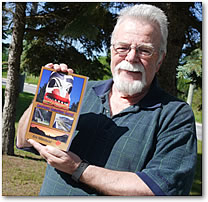
|
 |
Author
Eric Whitehead, Gilford resident, with his latest
book.
Shane MacDonald/Innisfil Journal |
|
Gilford man shares stories of adventure and life lessons in 70s roadtrip to Mexico |
By Natasha Philpott Innisfil Today January 2, 2021 |
50 years ago, Gilford's Eric Whitehead and best friend Murray Jupe embarked on a five-month road trip throughout Mexico and the U.S., an experience they say taught them many things about life, travel and culture.
Jan. 2, 2021 marks the 50th anniversary of the epic road trip from Toronto to Mexico and Las Vegas taken by best friends Eric Whitehead of Gilford, and Murray Jupe.
Their adventure diary is documented in their self-published book, Then There Was One: The Ultimate 70s Roadtrip., which captures the essence of the era, in the raw, tell-all tale.
"I kept a journal, the book is the journal," explains Whitehead, who wrote most of the entries.
"The language is antiquated and it's raw, but it reflected the time," shares Jupe.
In 1971 Whitehead, 19 and Jupe, 20 were living in Toronto. They went to high school together and had been planning the trip for two years prior, originally with two other friends. But as time went on, and circumstances changed, the four-man trip turned into two.
The friends knew they wanted to travel, but where and how was the question.
Europe seemed like a good idea, but with limited funds and concerns about the weather conditions, the pair decided on a road trip instead.
After much deliberation and budgeting, they purchased a used car for $500, packed up a tent and headed south for Acapulco, Mexico, then northwest through Texas to Las Vegas.
"This was the least expensive way to see the world," said Jupe.
It was the first time the pair had been out of the country without their parents. Throughout their travels, they met many unique individuals and experienced life to the fullest: camping in the desert, seeing Apollo 14 launch in Florida, witnessing a near-fatal accident, celebrating Jupe's 21st birthday Vegas-style - some experiences that have shaped them into the people they are today.
"It was a learning expedition really," said Jupe.
They share their shock and frustrations with some of the racist individuals they come across in the southern states and in Mexico.
'I believe that there is a simple formula in relations with the Mexican people. If you treat them with the respect that they deserve (and they deserve a lot of respect) and treat them with kindness, they will almost give their life for you. I honestly wish Canadians were more like that' reads an excerpt from Whitehead on Feb. 7, 1971.
"It (the racism) was just sickening," described Whitehead who says the trip taught him a lot about tolerance of others.
"We were two young guys who didn't know much about life, to be honest with you, and we learned an incredible amount about life in general," reflected Jupe.
On the road, they pair were constantly stopping to have their brakes on the car fixed.
"That was our biggest problem," said Whitehead.
All in all, the pair spent around $1,000 on car maintenance throughout the entire five-month adventure.
Back then, communication was not as instant as it is today and the only time they were able to connect with family and friends at home was through the odd pay-phone call or mail.
"We'd pick up our mail at the central post offices," explained Jupe.
After months of travelling together, a tiff threw a wrench in Whitehead and Jupe's plans, leaving Whitehead in Vegas all alone with Jupe flying to B.C. halfway through the trip.
"If you put two people together in a tent for months at a time, something's going to go wrong," said Jupe.
Looking back, he says resentments are pointless.
"What mattered when we were in Vegas...didn't really matter in life. Our friendship outweighed the animosity."
It wasn't until seven years after the trip, the pair saw each other by fluke while driving in Toronto. They reconnected and have been best friends ever since.
"And that's one of the biggest lessons in life is that we hang onto anger, resentments," said Jupe, who says it isn't worth it. "We've leaned on each other and helped each other out, and that's what friendship is."
After all these years Jupe and Whitehead remain the best of friends.
Jupe and his wife Karen, who live in Mississauga, feel that they have been 'adopted' by
Whitehead and his family, celebrating every holiday and special event together (except this year--thanks Covid!).
Whitehead has lived in Gilford with his wife (also named Karen) for the past 36 years. Whitehead says it was the road trip with Jupe that ignited his love and passion for travel. This was the first of many books Whitehead has published about his travels.
Before the book was published in 2010, every year on the anniversary of the trip, Whitehead would bring out the old journal and read it. As the years went by, the pages stared to deteriorate, which prompted him to have them officially published into a book.
Would they do the trip again?
In a heartbeat. It was the most memorable experience. But they don't think it would be possible in this day and age, with Covid, heigtened safety restrictions and all.
"I for one would not go back there now," said Whitehead
He and his wife have spent the past few years exploring Canada and encourage others to do the same.
"You'll never run out of places to visit in Canada," he says.
To learn more about the book, and to check out some of Whitehead's other travel works, visit https://www.thatroadtripbook.com/. To purchase a copy of the book, contact Whitehead by email at ewhitehead@rogers.com.
To To purchase a copy of the book ($25), contact him by calling 705-456-2215, or by emailing ewhitehead@rogers.com. |
|

|
 Ready to Roll – January 2, 1971 Ready to Roll – January 2, 1971 |
|
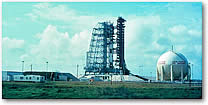
|
 Apollo XIV – January 1971 Apollo XIV – January 1971 |
|

|
 Miami – Superbowl V – January 1971 Miami – Superbowl V – January 1971 |
|

|
 Eric in northern Mexico– February 1971 Eric in northern Mexico– February 1971 |
|

|
 Murray, the Grand Canyon– March 1971 Murray, the Grand Canyon– March 1971 |
|
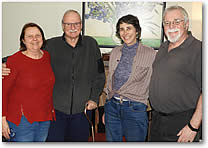
|
| Murray and Eric with their wives (both named Karen) – February 2020 |
|
|
Local author releases new book on 1973 African adventure that left him in hospital, sick for a decade |
By Natasha Philpott Innisfil Today March 21, 2021 |
In 1973, when he was 21-years-old, Gilford's Eric Whitehead made the journey to Africa as part of a six-week educational program with York University.
It was his first time flying on a plane, but not his first time travelling. Two years prior he had made the journey to Mexico throughout the U.S. on a road trip with his best friend Murray Jupe, which he documented in his book Then There Was One.
It was the trip to Mexico that whet Whitehead's appetite for travel and adventure. So when the opportunity to take part in the York Kenya Study Tour arose, he didn't hesitate to sign up. The tour would allow him to experience the country of Kenya, visiting Maralal, Thompson Falls, Nairobi, Mombasa, Tsavso National Park and Malindi.
The York-Kenya project was the first of its kind, which trained Kenyan civil servants in administration studies at York University. It gave students the opportunity of a lifetime to study and experience authentic African culture.
It was to be a great adventure, and Whitehead couldn't wait to experience Africa with 31 other classmates, ranging in age from 19-21. For many, it would be their first time away from home.
Little did he know he wouldn't be returning home with the rest of the group as planned due to a serious bout of illness that left him in hospital for 10 days.
Whitehead documented his entire adventure in a journal, which he recently published in a new book, Beneath the African Sky.
Thanks to the local professors who taught the program, the class was able to see parts of the country most tourists wouldn't, like visiting families living in 'Bomas', houses made of cow dung.
Other noteworthy adventures included an excursion through Rift Valley, wildlife sightings (shockingly Whitehead didn't even see one cat!), sailing and snorkeling in the Indian Ocean, visiting Thompson Falls, embarking on a safari in Tsavo, and visiting Turtle Bay.
One special part of the trip was having his own Safari jacket custom-made for just $9, a treasure he still has today.
His favourite part of the entire trip was seeing elephants in Tsavo.
"The Tsavo River is not very deep but the Dom palm trees draping the edges of the river give it that mystic, beautiful tropical look," he wrote. "The elephants in Tsavo West are different in appearance from those in Tsavo East. It is merely a colour difference. The Western elephants are not as red as the Eastern ones."
It was the Africa he had always dreamed of. Until it wasn't.
It was 24 hours before he was set to fly back to Toronto through Paris when Whitehead fell extremely ill with fever, chills, body aches, nausea, vomiting and loss of appetite, to the point where he couldn't stand up, let alone pack his bags.
His condition became so severe he had to be taken to hospital by ambulance "a super comfortable ride to the cemetery" he thought at the time, where he stayed for 10 days, missing his flight home with the rest of the group.
"I was falling apart, it was a real mess," he said.
It was the first time Whitehead ever had to stay in a hospital and says he didn't have any expectations or standards to compare to. He was just relieved to receive help.
After multiple tests and investigating, doctors are able to give him a proper diagnosis and get him well enough to fly home.
"My plane ticket to get home was a week old, from Paris to Toronto, and it had been an excursion ticket that had been issued to the whole group so they didn't honour any of that," he said, having to ask family to wire him enough money for a new ticket to get home.
For about 10 years after the trip, he would experience bad bouts of illness from the event in Africa.
Looking back, he says he wished he would have been more aware of the dangers and risks associated with travelling in a foreign country. Despite falling ill, he doesn't regret the trip and says he learned a lot about himself in those months of adventure.
In the book, Whitehead looks back and ponders how of his whole class only he had the mysterious illness.
Throughout the trip, Whitehead developed strong bonds with his classmates that he still keeps in touch with. Prior to the pandemic, he would meet up with a few of them once a year for dinner in Toronto.
"In a lot of ways it was like being at summer camp," he described. "I met a wonderful group of young people who educated themselves and went on to careers aimed at making life better for those around them."
Like his many other travel adventure books, Beneath the African Sky is written in a casual tone as if you are on the adventure with him.
"It was an experience we'll never forget," he described.
Years later, one of the professors Mike Rainy had emailed the group letting them know their class trip was the start of a set of field study programs for multiple American universities that lasted over 40 years, until 2014, after he and his wife retired from the profession.
Whitehead lives in Gilford with his wife Karen. He retired in 2008 and has been travelling the world since the 1970s.
Anyone interested in purchasing a copy of his new book or other travel publications can contact him by calling 705-456-2215, or by emailing ewhitehead@rogers.com.
|
 |
 |
 |
| Maralal Lodge |
Samburu festival |
Eric at the Lodge |
 |
 |
 |
| elephants ready to charge |
Tsavo sunset |
mosque in Malindi |
|
|

|
 |
Author
Eric Whitehead, Gilford resident, his latest
book, Beneath The African Sky. |
|
Want to better appreciate Canada? Pick up Road Trip Guy's latest work |
By Amber Green Innisfil Today June 19, 2024 |
Gilford author Eric Whitehead’s 20th publication, Canada: Coast to Coast to Coast, explores Ontario, Quebec and several other provinces.
Eric Whitehead’s 20th publication, Canada: Coast to Coast to Coast, explores Ontario, Quebec, Newfoundland and Labrador, Nova Scotia, New Brunswick, Prince Edward Island, and Saint Pierre and Miquelon — which is a French archipelago south of Newfoundland.
Though it is not intended to be a travel guide, Whitehead thoroughly researches each place he visits. He uses his journals and notes to meticulously assemble each of his publications — which feature his photos — but his most recent publication includes something that none of his other books do. Each chapter concludes with a QR code, which, when scanned, redirects to a YouTube video that features the places noted in that chapter.
“Anyone who travels or wants to travel can enjoy it. Generally speaking, older people may identify more with my writing style and observations,” Whitehead said. “The biggest thing you will get from this book is an understanding and appreciation of just how vast and beautiful Canada is. You will never run out of wonderful things to see and do in Canada.”
Previously featured by InnisfilToday in January and March of 2021, Whitehead — who is called the Road Trip Guy — said that he writes feel-good stories that may make readers laugh.
“Many people have commented when they read my books they feel like they are on the trip with me,” he said.
Whitehead and his wife, Karen — who met in high school — have been travelling together for over 46 years. Whitehead has visited all 50 American states, and 10 provinces and two territories in Canada. He's travelled to Antarctica and 20 countries in Central America, South America, Europe, Africa and Asia. With his worldly experience in mind, InnisfilToday asked him what makes Canada so special.
“Canada is special for so many reasons but what stands out to me is the kindness of the people, the incredible variety of scenery and the fact that the country is enormous,” Whitehead said. “You have to drive through Canada to realize and appreciate just how vast it is. If you take your time to enjoy it, Ontario alone will take four to five days to drive through.”
Though he has always lived in Ontario, Newfoundland is his favourite province.
“Scenically, it has everything — mountains, forests, seascapes, lighthouses, crashing ocean waves, icebergs in the spring and early summer, it's all there. But the people are what makes the province special. If you've seen Come From Away, it is true to life.”
Canada: Coast to Coast to Coast includes a section about Saint Pierre and Miquelon, which is beyond the country’s borders, 90 minutes from Newfoundland.
“It is such a unique destination so readily available to Canadians,” he said. “It is part of France … Other than flying directly from France you cannot get to (Saint Pierre and Miquelon) without setting foot on Canadian soil. You can fly from St. John's or take a ferry from Fortune, (Newfoundland).”
Whitehead said that Canadians do not require passports or visas to visit Saint Pierre and Miquelon.
Readers eager to explore Canada may be interested to know that the top places Whitehead recommends that people visit are St. John’s, the Badlands in Saskatchewan, and the mountains in Alberta and British Columbia.
“I have seen and spent time in the Rockies in Colorado, the Alps and the Atlas Mountains in Africa, and the South American Andes, and none of them made me feel the awe I feel driving through our Rocky Mountains,” he said.
Whitehead said he has enjoyed writing as long as he can remember. His English teacher in high school was very encouraging. “(He) was very supportive of my efforts and was someone I admired and still do. We have remained in touch to this day — more than 50 years.”
When asked about his writing process, Whitehead explained, “I'm an early riser so (I) do most of my work in the morning. I usually spend about six hours a day writing current and future books. There's always something on the go. I take an early morning walk and I'd be lying if I didn't admit a beautiful sunrise on an hour-long walk in Gilford did not inspire me somewhat.”
An Innisfil resident for 40 years, Whitehead explained why he and his wife relocated to Gilford before their eldest son started school.
“I wanted the kids to experience life in a small town. Turns out we loved it,” he said. “You knew all your neighbours' names, or at least the names of their dogs. Innisfill is now the victim of urban sprawl like everywhere else but Gilford has remained relatively small. I can't imagine living anywhere else.”
Whitehead looks forward to releasing a second volume of Canada: Coast to Coast to Coast, which will include his travels to B.C. He and his wife will travel to Alberta this fall and they plan to visit Nunavut next year.
The book features 75 pages of photos along with 180 pages of text. It is available for $35 plus shipping and handling, but Whitehead noted that those living in Innisfil and Bradford save the shipping and handling costs, as he offers delivery to those locations.
Anyone interested in purchasing a copy of his new book or other travel publications can contact him by calling 705-456-2215, or by emailing ewhitehead@rogers.com.
|
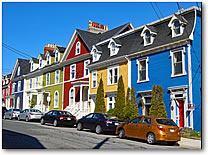 |
|
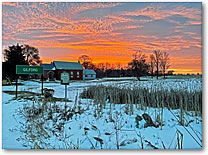 |
| St. John's, Newfoundland in June 2014 |
|
Sunrise in Gilford in February 2024 |
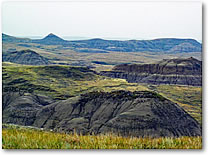 |
|
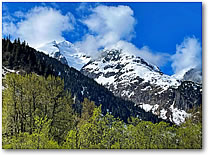 |
| The Badlands, Saskatchewan in September 2019 |
|
Near Stewart, British Columbia in May 2024 |
|
|
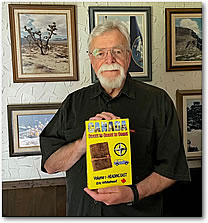
|
 |
Author
Eric Whitehead, Gilford resident, his latest
book, Canada: Coast to Coast to Coast. |
|
|

